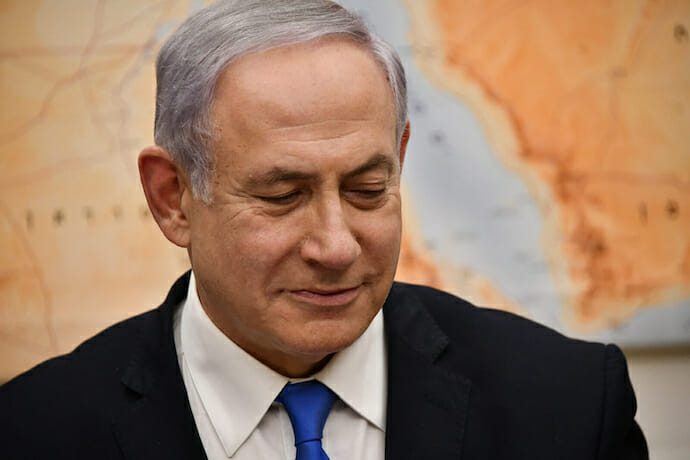
Israeli Annexation Plans and Consequences for Jordan
In light of Israeli Prime Minister Benjamin Netanyahu’s plan to annex 30-40 percent of the West Bank (including the Jordan Valley), the Palestinian Authority (PA) and the Hashemite Kingdom of Jordan find themselves in a difficult position. Officials in the PA and Amman have been attempting to ward off the threats that this unilateral move would pose. Indeed, the dangers would not only put Palestinians and Jordanians in a dangerous situation, but the chaos that the annexation process could unleash would threaten stability across the greater Middle East.
Jordan is concerned that the renewed displacement of Palestinians currently in the occupied West Bank will lead to heavier burdens being imposed on the Hashemite Kingdom. From Amman’s perspective, the future of security and stability in Jordan is on the line. Yet Jordan finds itself in a difficult position, particularly given its close partnership with Israel’s closest friend, the United States. Amman rejects the idea that it is acceptable for there to be a resettlement of more Palestinians into/toward Jordan. Authorities in Jordan’s government are emphasizing how their government will not implement any plan that undermines their country’s national interests.
On June 18, Jordan’s Minister of Foreign Affairs, Ayman Safadi, said that after talks in Ramallah with Palestinian President Mahmoud Abbas and other top Palestinian officials, Israel “will be choosing conflict and escalation” if it continues with its plot to annex parts of the West Bank next month. “The position I carried today reaffirms the kingdom’s historic and firm stance, which is based on fulfilling the rights of our [Palestinian] brothers to freedom and establishing a Palestinian state on the June 4, 1967 borders, as the only way to achieve a just and comprehensive peace. Our historical message is that Jordan stands with all its capabilities alongside our brothers in upholding their full legitimate rights,” said Safadi.
Jordan is working with all concerned parties to prevent the annexation process from moving forward. Officials in Amman are standing by the two-state solution as the basis for resolving the Palestinian-Israeli conflict. Jordan’s message to Israel and the whole world is that Tel Aviv annexing parts of the West Bank will jeopardize the 1994 peace treaty between Jordan and Israel while also threatening to sow chaos across the Middle East.
“If Israel goes ahead with annexation, it will be choosing conflict and escalation instead of peace,” said Jordan’s chief diplomat. “It will have to deal with the consequences – not just in its relationship with Jordan. It will also be harming regional efforts to achieve a just and comprehensive solution.”
Former Jordanian Prime Minister Marouf al-Bakhit said that the Israeli decision to annex the West Bank and the Jordan Valley will kill the peace process and violate international laws, pointing out that the military option to solve the Palestinian issue is on the table.
Speaking in an interview with Jordanian Roya TV channel, al-Bakhit said that the U.S. and Israel have agreed on the broad political lines that could lead to the Israeli control of the Middle East region.
“I am sure that neither the U.S. nor any other country can implement anything as long as Jordanians and Palestinians reject these projects and plans. Any submitted plan must be accepted by all parties, and if it is to be imposed, such a plan will be born dead,” said al-Bakhit.

On June 16, Jordan’s King Abdullah II said that Israeli annexation of the West Bank and the Jordan Valley would destabilize the Middle East region. The king, who was speaking via video conference with American congressional leaders and committee heads, “warned that any unilateral Israeli measure to annex lands in the West Bank is unacceptable and undermines the prospects of achieving peace and stability in the region.”
However, one day later, Netanyahu briefed Israeli defense minister and opposition leader Benny Gantz on the annexation scenarios and timeline.
Pressure Intensifies on Jordan
The Jordanian stance towards the Palestinian-Israeli conflict is based on an independent, sovereign and viable state with East Jerusalem as its capital. This is the only means to a just, comprehensive and lasting peace as Amman sees it. Jordanian officials are well aware of the possibility of the annexation process triggering a new intifada. At the same time, domestic pressures are intensifying with various segments of Jordanian society demanding that King Abdullah II pull his country out of the 1994 peace treaty.
Marouf al-Bakhit confirmed that Jordan and the PA bet on the steadfastness of the Palestinian people on their land, and that all options are open, pointing out that the PA is in a difficult position, and the options available to them are few. He warned that this would ignite a new intifada.
I assured King Abdullah in our phone conversation of UAE’s full solidarity with Jordan & our categorical rejection of accepting Israel’s illegal annexation of Palestinian lands. We are working with our Arab brethren & the international community against this illegal move.
— محمد بن زايد (@MohamedBinZayed) June 17, 2020
Indeed, Israel’s announcement of its plans to annex parts of the West Bank are forcing Jordanian officials to begin questioning the nature of their relationship with Tel Aviv.
Former Chief of Staff Khaled al-Sarayrah stated that Jordan “will not allow” the expansion of “Israel” and the annexation of Jordan Valley. Speaking in an interview with a local Jordanian radio station, Al-Sarayrah said that Jordan’s political leadership, people, and geography make the country strong when it comes to dealing with Israel. Al-Sarayrah reiterated: “We in Jordan are strong and we have more than one option to deal with Israel,” stressing that Jordanians know how to fight the Israeli army and that the Arab country has options to do so.
But where do Jordan’s friends across the Arab region stand with respect to mounting friction in Jordan-Israel relations that could take a turn for the worse next month if the annexation process begins? Bakhit described the Arab position vis-à-vis the West Bank’s status as lax due to regional instability and civil wars in some parts of the region which have pushed more Arab governments into a tacit partnership with Israel despite lacking formal diplomatic ties with Tel Aviv.
Abu Dhabi’s Crown Prince Sheikh Mohammad bin Zayed Al Nahyan, who is the UAE’s de facto ruler, supports Jordan’s position in favor of a two-state solution and voiced his rejection of the annexation process of the West Bank and the Jordan Valley. He tweeted: “I assured King Abdullah in our phone conversation of UAE’s full solidarity with Jordan & our categorical rejection of accepting Israel’s illegal annexation of Palestinian lands. We are working with our Arab brethren & the international community against this illegal move.”
By the same token, the UAE’s leadership has also made it clear that the Emiratis should continue cooperating with Israel in various domains even if Abu Dhabi and Tel Aviv disagree on issues related to the Palestinians, chief among them is Israel’s plan to annex 30-40 percent of the West Bank.
In the Gulf region, Jordan is likely to find Kuwait as its strongest source of support vis-à-vis Israel. Unlike the other five Gulf Cooperation Council member-states which, to various extents and for various reasons, have warmed up to Israel in recent years, Kuwait refuses to do so. The Kuwaiti view is that until or unless Israel ends its occupation of Palestinian land and agrees to a two-state solution based on the 1967 borders, Arab League members should not warm up to Israel. The logic is that collective pressure from the community of Arab states will give Israel more incentive to make concessions in exchange for the opening of formal diplomatic ties with the wider Arab world.
Doubtless, out of all Arab governments, none have as much at stake in the West Bank annexation process as Jordan. By virtue of domestic politics in the Hashemite Kingdom, Jordan’s demographic realities, and geography, the chaos which could be unleashed next month will likely create problems for Jordan that will be far more serious than what other Arab states would probably have to face under such circumstances.
In July 2020, Jordan’s relationship with Israel may change in major ways. At the same time, Amman’s ties with other Arab capitals may experience new problems if there is a growing perception in Jordan that other governments across the region are failing to do enough to stand by the Hashemite Kingdom amid an Israeli annexation of the West Bank which would directly threaten stability in Jordan.

